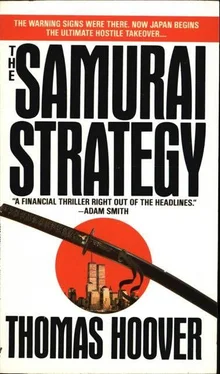Thomas Hoover - The samurai strategy
Здесь есть возможность читать онлайн «Thomas Hoover - The samurai strategy» весь текст электронной книги совершенно бесплатно (целиком полную версию без сокращений). В некоторых случаях можно слушать аудио, скачать через торрент в формате fb2 и присутствует краткое содержание. Жанр: Триллер, на английском языке. Описание произведения, (предисловие) а так же отзывы посетителей доступны на портале библиотеки ЛибКат.
- Название:The samurai strategy
- Автор:
- Жанр:
- Год:неизвестен
- ISBN:нет данных
- Рейтинг книги:5 / 5. Голосов: 1
-
Избранное:Добавить в избранное
- Отзывы:
-
Ваша оценка:
- 100
- 1
- 2
- 3
- 4
- 5
The samurai strategy: краткое содержание, описание и аннотация
Предлагаем к чтению аннотацию, описание, краткое содержание или предисловие (зависит от того, что написал сам автор книги «The samurai strategy»). Если вы не нашли необходимую информацию о книге — напишите в комментариях, мы постараемся отыскать её.
The samurai strategy — читать онлайн бесплатно полную книгу (весь текст) целиком
Ниже представлен текст книги, разбитый по страницам. Система сохранения места последней прочитанной страницы, позволяет с удобством читать онлайн бесплатно книгу «The samurai strategy», без необходимости каждый раз заново искать на чём Вы остановились. Поставьте закладку, и сможете в любой момент перейти на страницу, на которой закончили чтение.
Интервал:
Закладка:
You guessed it. With the trillions and trillions now at its disposal, Japan was about to take charge of America's future.
CHAPTER FOURTEEN
The task ahead can be described very simply. I was going to help Dai Nippon acquire controlling stock positions in a bevy of ineptly managed American high-tech companies, and she was going to be in charge of turning them around. I was DNI's takeover artist; Tam was the fix-it expert. That probably sounds a bit ambitious on everybody's part, but after watching the Dai Nippon juggernaut for a couple of days I knew one thing for sure: we'd have plenty of heavy backup.
Why did I agree to ride shotgun for Matsuo Noda's "Save America" project? Because, if he meant what he said, such a program was long overdue. American industry was in trouble, and it was hurting a lot of good, hardworking people who didn't deserve to be hurt. Worse still, this wasn't some random act of God. It was largely the result of self-serving corporate management. Most occupiers of the executive suites these days were too busy merging and acquiring and leveraging to do what stockholders thought they were paying them for: building industry and creating American jobs. (Well, maybe that's an overstatement; they had kept Drexel Burnham's junk-bond cowboys working overtime.) In the mid-eighties, American corporations were spending two and three times more on mergers and acquisitions than on research and development. Most industrialists here no longer cared to try making anything as old-fashioned as competitive products; they preferred to make deals and sell imports. The net result was that America, the world's major economic locomotive, was veering off the track and seriously in danger of taking everybody else in the world along with it.
That's where Matsuo Noda came in. Part of the arrangement he'd made with the Japanese institutions putting up the funds was that he would be given proxy to exercise all voting rights. Face it, he had a pretty impressive performance record overseeing the long-range planning and investment of well-run corporations. So after I'd helped Dai Nippon acquire control of a long list of poorly managed companies, he and Tam Richardson were planning to move in, clear out the deadwood, and lay down priorities for restructuring. She was Dai Nippon's technical director for all U.S. operations, which meant she was going to head up the team on the newly evacuated floor just above the financial section-Noda's management samurai.
Enough theory. Here's how it actually went. On Friday the story was finally broken by The Wall Street Journal, a little squib in "What's News," with a short two-column analysis on page 3. The piece revealed that all the heavy new activity building in the high-tech sector of the market represented buys being coordinated by a new Japanese investment concern.
This sudden, unexpected program of foreign investment was heralded at first as a salubrious omen, refuting those doomsayers who were claiming the world had lost confidence in the U.S. In fact, if anything it was proof that overseas enthusiasm was actually increasing. Japan's previous practice of focusing on debt instruments was at best passive investment. But buying heavily into a sector of the economy that appeared weak was something else entirely. It was a rousing endorsement of America's prospects.
To be fair, there was still a modest case to be made in that direction. Our high-tech sector wasn't all struggling high fliers operating out of some one-story cinder block on Route 128 or the Washington Beltway. America had plenty of solid industry in high tech-computers, aerospace, office machinery-and American laboratories and universities were the envy of the world. The problem lay with the downside. We'd lost our lead in electronics, drugs, scientific instruments, plastics, communications equipment… it's a long list. In fact, America's overall trade balance in high-tech products had actually gone negative, shrunk from a twenty-five billion dollar surplus as recently as 1980. The ignored question, therefore: Given the direction things were headed, why were the Japanese suddenly supposed to be so impressed?
The market's initial euphoria didn't last long however. By the end of the second week the SEC was sniffing the air and the lunch talk downtown, from the AMEX traders at Harry's to the expense-account crowd at historic Fraunces Tavern, was focused on what appeared to be a major shift in Japan's investment strategy. Now that the stock market was in shambles, they weren't just dabbling anymore; they were cashing in on the fire sale hand over fist.
Thus the Street's early cheering melted into apprehension. Japan had already taken apart our debt and currency markets, turned them upside down, and scored a bundle. Now Noda had Wall Street looking over its shoulder and reminiscing about the good old days when all it had to worry about was rich, crazy Arabs. When it became clear that Dai Nippon was assaulting the U.S. securities markets with high-speed computers and a checkbook that just kept coming, there weren't all that many wisecracks about camels and tents.
Wall Street, however, merely counts; it doesn't think. The real disquiet was reserved for corporate boardrooms. Take it as a given that when the Securities and Exchange Commission reports some ten, twenty, or thirty percent of your company's stock has just been swallowed by a cash-rich Japanese raider, your attention can focus most exquisitely. In a word, Matsuo Noda was the talk of industrial America. More to the point, and exactly what he had expected, the boards and CEOs of the companies being bought were beginning to be scared shitless. A major player with seemingly bottomless pockets was gobbling up heavy blocks of their publicly traded shares. Worse still, nobody had the slightest inkling why.
What all those entrenched CEOs didn't realize, in their wildest paranoia, was that seven-figure salaries and cushy executive perks were about to go the way of Cadillac tail fins. World competition, not executive compensation, would be the new game. Playtime was over; America was about to get serious again.
My early suspicions concerning my role in Noda's design had been precisely on the mark. I was indeed the freelance gunslinger he wanted by his side when the companies he was aiming at started to shoot back, which they surely would. Needless to say, if his plan was ever allowed to reach the courts, it would create a virtual "living trust" for half the corporate lawyers in the land. He'd be in litigation through the twenty-first century as managements fought to the last stockholder's dollar to keep their jobs.
Enter Matt Walton. Time for some samurai-style legal swordsmanship.
The rules: If you're CEO of a company and somebody starts buying up a major chunk of your stock with the intent of taking you over, you've got roughly four basic ways to stop him. The first is to try and bribe that buyer to go away, paying him a ransom-politely called greenmail-to sell his holdings and disappear. (More than one corporate raider you've read about in the papers has made millions in a couple of weeks using that very play.) The drawbacks of trying to buy off a potential acquirer are, (1) it's expensive, and (2) maybe he really does plan to eat you, in which case it won't work anyway. Matsuo Noda was in that category.
A second popular means to thwart a hostile takeover is to go out and find somebody else to buy you first, the proverbial "white knight." Ideally this friendly buyer should be, (1) too big to be taken over himself, and (2) willing to let you keep your playpen.
A third technique to stop somebody from acquiring a controlling chunk of your stock is to jack up the price, usually by offering to buy it yourself. Float some junk bonds, sell off a few divisions, do anything that will raise cash and then offer the shareholders more than the raider is willing to bid. This can be very expensive, but if you're a CEO with millions in compensation every year, why should you care if your stockholders' company is leveraged to the brink of ruin? You've still got your job and your goodies. It's used a lot.
Читать дальшеИнтервал:
Закладка:
Похожие книги на «The samurai strategy»
Представляем Вашему вниманию похожие книги на «The samurai strategy» списком для выбора. Мы отобрали схожую по названию и смыслу литературу в надежде предоставить читателям больше вариантов отыскать новые, интересные, ещё непрочитанные произведения.
Обсуждение, отзывы о книге «The samurai strategy» и просто собственные мнения читателей. Оставьте ваши комментарии, напишите, что Вы думаете о произведении, его смысле или главных героях. Укажите что конкретно понравилось, а что нет, и почему Вы так считаете.












